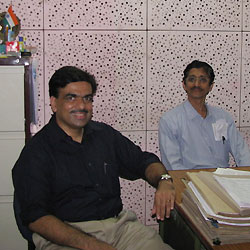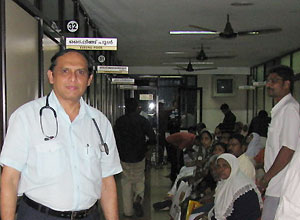

Bridging His Worlds
Dr. Joe Verghese: Bridging Neurology, Geriatrics and More
With the recent appointment of Dr. Joe Verghese as chief of geriatrics, Einstein is forging a unique integration that someday may mean a better quality of life for older people.
In April, following a national search, Dr. Verghese took on the role of chief of the department of medicine’s division of geriatrics at both Einstein and its University Hospital, Montefiore Medical Center. In addition, he continues to serve as director of the division of cognitive and motor aging within the department of neurology, a position he has held since 2007. (Dr. Verghese serves as professor of neurology at Einstein, and is the Murray D. Gross Memorial Faculty Scholar in Gerontology. He also is a practicing neurologist.)

Dr. Verghese with his co-PI, Dr. Mathuranath, in Kerala, India.This new, dual role strengthens the synergy between the two divisions, a synergy that’s increasingly important as science explores the neurocognitive disorders of older adults, according to Dr. Victor Schuster, professor and chair of medicine.
"I know I also speak for Mark Mehler, chair of neurology, in expressing our mutual excitement about Joe's appointment and the opportunity for collaboration that it brings to our two departments," Dr. Schuster said. "The appointment strengthens the bridge between neurology and geriatrics, and dovetails with research and other work that now surrounds aging and dementia. Joe is a natural leader, and with him we have the right person, in the right place, at the right time."
He added, "To my knowledge, there is no integrated role like this elsewhere; it’s unique."
The link between neurology and geriatrics is a critical one. As the world's population ages, the incidence of diseases such as Alzheimer's and Parkinson’s is soaring – and creating neurocognitive impairment in more and more adults. Dr. Verghese's research focuses on the effects of diseases and aging on cognition and mobility.
Besides linking the two Einstein divisions, Dr. Verghese is linking two parts of the globe. A native of India, he co-leads a study of cognitive decline risk factors with Dr. P.S. Mathuranath, director of the division of behavioral neurology at the Sree Chitra Tirunal Institute, one of that country’s premier postgraduate medical institutes. The study is examining how diet, physical activity and social groups may prevent types of cardiovascular disease that lead to dementia in a cohort of 1,700 older adults from Kerala, the Indian state where Dr. Verghese was born.
"I wouldn't be where I am without my training and experience in India. Personally, I feel a deep need to give back," he said.
Closer to his current home, Dr. Verghese also leads a project within the Einstein Aging Study, a longitudinal study featuring participants from the Bronx. His research within the study is exploring whether changes in gait and mobility can be used as early-warning signs of later decline and dementia in older adults. Within his division, Dr. Verghese also collaborates with Dr. Roee Holtzer, associate professor of neurology at Einstein and a neuropsychologist at Yeshiva University’s Ferkauf Graduate School of Psychology, on various aging studies.

Dr. Verghese’s collaborator, Dr. Salam, at Baby Memorial
Hospital’s neurology clinic -- still seeing patients at 8 p.m.To these studies and others, Dr. Verghese applies the lessons he learned from the Clinical Research Training Program (CRTP) within the Einstein-Montefiore Institute for Clinical and Translational Research (ICTR). A two-year program that leads to a master’s of science degree in clinical research methods, the program trains investigators to form research questions, design and conduct clinical studies and analyze data. Trainees – who come from all levels and medical specialties – complete a rigorous curriculum of epidemiology, biostatistics and other topics, as well as a hypothesis-driven research project under the guidance of a mentor.
"Before participating in the CRTP, I didn’t have all the right tools to plan a study and conduct analysis," Dr. Verghese said. "I gained very important knowledge in the program, and grew in confidence."
Eleven years after graduating from the CRTP, Dr. Verghese now serves as one of its mentors. "It’s exciting to see Joe come full circle," said Dr. Ellie Schoenbaum, an infectious disease specialist and professor of epidemiology & population health who directs the CRTP, as well as the ICTR’s Ph.D. program in clinical investigation.
"Joe was one of our first graduates, and it was clear he had the ‘fire in the belly' that the CRTP looks for. A physician-scientist is different from a traditional clinician. He or she sees medicine through data and can ask critical research questions in his or her area, thereby advancing the field through research."
As Dr. Verghese shares his experience with future investigators, he also learns from their experiences. "I'm a strong believer in multidisciplinary solutions to scientific problems," he said. "And it's exciting to learn from others – to have a theory but be able to approach it in different ways. In my own work, I know that the problems of aging require this ability to connect different perspectives and see the big picture."
Today, whether he's connecting clinical researchers, countries, or academic divisions, Dr. Verghese clearly sees that picture.
Posted on: Thursday, May 31, 2012


